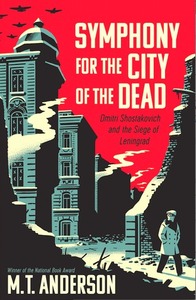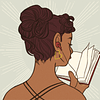Take a photo of a barcode or cover
370 reviews for:
Symphony for the City of the Dead: Dmitri Shostakovich and the Siege of Leningrad
M.T. Anderson
370 reviews for:
Symphony for the City of the Dead: Dmitri Shostakovich and the Siege of Leningrad
M.T. Anderson
Oy gevalt.
Look. This book is a passion project. Hearing M.T. Anderson talk about it at ALA during the YALSA Coffee Klatch was amazing; I've never seen someone so excited about their work. It made me beyond excited to read it.
But holy moly is this dense. So dense. It took me more than two months to get through it because it was exhausting. Twenty pages a day was about all I could manage.
I found it less interesting than I thought, but that may be because I got kicked out of world history class the one day of ninth grade that we did the Russian Revolution and thus I am not very knowledgeable about this part of history. And as someone who was a musicology major for a portion of college, I expected to be more into the music history element, and I couldn't access it.
I dunno. This book is for other readers, and it's obviously impeccably researched by someone who makes even the smartest people look unintelligent whenever he presents at conferences, but I never found myself enjoying the ride.
Look. This book is a passion project. Hearing M.T. Anderson talk about it at ALA during the YALSA Coffee Klatch was amazing; I've never seen someone so excited about their work. It made me beyond excited to read it.
But holy moly is this dense. So dense. It took me more than two months to get through it because it was exhausting. Twenty pages a day was about all I could manage.
I found it less interesting than I thought, but that may be because I got kicked out of world history class the one day of ninth grade that we did the Russian Revolution and thus I am not very knowledgeable about this part of history. And as someone who was a musicology major for a portion of college, I expected to be more into the music history element, and I couldn't access it.
I dunno. This book is for other readers, and it's obviously impeccably researched by someone who makes even the smartest people look unintelligent whenever he presents at conferences, but I never found myself enjoying the ride.
A well reasearched and composed biography/microhistory. Anderson makes everything come to life: the terror and horrors of Stalin's regime and the siege of Leningrad as well as the struggles and triumphs of the composer and his family.
First off, this was such an excellent and detailed exploration of Shostakovich's life around the time of the Bolshevik Revolution through the end of WWII (and a bit beyond). The discussion of tyranny and how it impacts people, how desperation affects humanity, how music affects a national consciousness, and what war does to a nation was so well-researched, thorough, and powerful.
I LOVE THAT THIS IS FOR TEEN READERS. The content was high-level but with plenty of context and some pauses to discuss why something was significant. It expected teens to dig in with a spade in each hand, but it also provided tools for understanding. This is a book that reminds us that history is interesting, important, and accessible.
Highly, highly, highly recommended to both teens and adults. I learned so much from this that my history classes skimmed over!
I LOVE THAT THIS IS FOR TEEN READERS. The content was high-level but with plenty of context and some pauses to discuss why something was significant. It expected teens to dig in with a spade in each hand, but it also provided tools for understanding. This is a book that reminds us that history is interesting, important, and accessible.
Highly, highly, highly recommended to both teens and adults. I learned so much from this that my history classes skimmed over!
Wow. This is a FFW read for 2024, but so different from the other things by this author. It took considerable effort for me to continue reading this, as it felt like a slightly more narrative history textbook for a bit. But at some point I realized I was invested, and also learning a lot. The horrors of war were so visceral in description that I felt nauseous at times. And then the power of art, music, creativity and humanity would shine through. I stopped and listened to various Shostakovich symphonies throughout, and will never forget his Seventh. Seems like this could be required reading as a world history textbook for highschoolers, and honestly I am surprised to say that I recommend it.
4.5/5
Physical copy- includes photos!
Ughhhhhhhh... I teared up so much. The details about the siege of Leningrad, the trials individuals went through for food and freedom- whether from Stalin or Hitler. Very moving piece.
Physical copy- includes photos!
Ughhhhhhhh... I teared up so much. The details about the siege of Leningrad, the trials individuals went through for food and freedom- whether from Stalin or Hitler. Very moving piece.
It's a fascinating look at Russia, WWII, and classical music. A bit dry, but I found myself wanting to listen to and find out more about Shostakovich's music.
This one took me a long time because there's a particular mindset necessary to dig in to so much history and devastation. This is a fascinating lens through which to examine music, or war, and I learned about both in the journey. Recommend.
I didn't even realize this was considered "young adult" history, but I guess the style is less dense than "adult" history books. Still, adults will benefit and enjoy this book equally well since Anderson tells this story in a very colloquial, conversational manner. I highly appreciated that pictures were scattered around the text instead of lumped together in the middle, because you could easily reference them, though I wish there was some way to do so with the music - I resorted to YouTube to play the symphonies and string quartets as they were being discussed. Even so, I could really feel the power that Shostakovich's music had for Leningrad, Russia, and the Allies in such a devastating time. I'm equally glad that Anderson framed it as a sort of biography of both Shostakovich and the city of Leningrad, speaking of them before the war and post-war, because I think that helped me understand why his seventh symphony resonated so strongly. A highly recommended read for anyone (young or not young) who is interested in Russian or WWII history and/or music.
I liked it overall, but I had a hard time getting used to the writing style. I'm not sure I ever did. Part 1 was not as good as Part 2. They almost seemed like 2 completely different books. (And Part 3 is good as far as epilogues go.) I did learn a lot about aspects of the Second World War that I never knew much about. I feel like the Soviet side of the war is glossed over in Western history classes, so this was a good introduction to it that helped make a very grim and very dark and disturbing part of history somewhat relatable through the story of Shostakovich and his family.
It took me a bit to get into this book, but that was only my personal reservations for reading nonfiction. After I got over my hang ups, this book was fascinating and wonderfully written. I love Shostakovich’s music, which is what originally drew me to this book, but I also loved reading about a slice of history I don’t know much about: Operation Barbarossa, the Nazi campaign in Russia. There are also some wonderful photos to go along with the text, which really helps me when reading nonfiction. Sometimes, you forget this really happened, so seeing historic photos really helps cement it.





